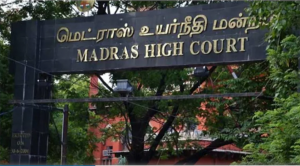 The Hon’ble High Court of Madras vide its order dated 13.03.2023 in the matter of M/s Grundfos Pumps India Pvt. Ltd., Rep. By Mr. A Venkatraman – Director, Chennai Vs. The Joint Commissioner of GST & Central Excise, Chennai in Writ Petition No.19170 of 2020 And W.M.P.Nos.23748 of 2020 & 13331 of 2021, set aside the order to the extent it levies interest under Section 50(3) of the CGST Act. It was held that the liability to interest will arise only in a situation where there has been actual utilisation of the credit by the assessee.
The Hon’ble High Court of Madras vide its order dated 13.03.2023 in the matter of M/s Grundfos Pumps India Pvt. Ltd., Rep. By Mr. A Venkatraman – Director, Chennai Vs. The Joint Commissioner of GST & Central Excise, Chennai in Writ Petition No.19170 of 2020 And W.M.P.Nos.23748 of 2020 & 13331 of 2021, set aside the order to the extent it levies interest under Section 50(3) of the CGST Act. It was held that the liability to interest will arise only in a situation where there has been actual utilisation of the credit by the assessee.
The Petitioner filed the writ petition before the Hon’ble High Court challenging the order-in-original dated 18.11.2020, which has been passed contrary to the settled judicial principles and the law laid down by the Hon’ble Supreme Court in several matters including in the case of Commissioner of Central Excise v. Bombay Dyeing Manufacturing Company [(2007) 215 ELT3].
Facts Of The Case: –
- That the petitioner had been an assessee under the erstwhile Central Excise Regime as well as Finance Act, 1994 under which service tax is levied and migrated into the regime of GST on and from 01.07.2017.
- The Petitioner filed Tran- 1 on 10.07.2017 and 11.08.2017 carrying forward the unutilized credit as transitional credit, which has not been disputed by the respondent. Though the credit had been transitioned, it was not credited in Electronic Credit Ledger (ECL), which reflects the credit available to a particular assessee and this document falls withing the domain of GST department. However, there is no explanation that why that transitional could not credited to ECL and the same was unavailable in the ECL.
- The petitioner reflected the same as available ITC in its retention and in Form GSTR-3B return. Thereafter, the petitioner realised that the said credit, without any explanation, was reflecting in ECL. Thus, the credit had been reversed on 20.07.2018 without set off/utilization against the output tax liability.
- That the audit wing of the GST department on noticing the reversal of credit, which was available in GSTR – 3B, demanded the interest at the rate of 24%, irrespective of fact that such credit had not been utilized. The same position was obtained in regard to Education Cess and Higher Education Cess as well in respect of which the facts are identical.
- Based on the audit objection, a show cause notice was issued on 26.07.2019 proposing to recover the interest invoking section 50(3) of the CGST Act and to deny the CENVAT credit on inputs lying in stock.
Held: –
- The Hon’ble Court after considering the submissions made and facts of the case, permitted the petitioner to challenge the portion of the impugned order i.e., with respect to disallowance relating to slow moving stock, within 30 days from that day without reference. The aforesaid, issue has not been challenged in this writ petition by the petitioner and liberty was sought to challenge the same by way of statutory appeal.
- With respect to the first issue, the Hon’ble Court was of the view that the petitioner cannot be faulted for the same, since transition has been sought in line with the procedures set out under the Act and Rules. The flaw was in the maintenance of the ECL by revenue. Thus, the petitioner was quite justified in ensuring, by all legitimate methods possible, that the said credit was available for utilization, as and when required.
- Thereafter, the Hon’ble Court after perusal of Section 50(3) and the amendment/substitution in Section 50(3), found that it is quite evident that liability to interest would arise only in a situation where the credit has been actually utilised by the assessee.
- From the language post substitution, it is very clear that where there is undue or excess claim of ITC under Section 42(10), which states ‘that the input tax liability should have been utilized to reduce output tax liability’, or undue or excess reduction in input tax liability under section 43(3), the liability of interest would be in a situation where there is a revenue impact.
- That in view of the retrospective amendment of 2022, it is only when ITC has been wrongly availed and utilized with a revenue impact, that interest liability is attracted. In the present case, the original error of non-maintenance of ECL is admittedly related to the department. Moreover, the petitioner has not utilized the credit.
- In such circumstances, it was held by the Hon’ble Court there is no liability to interest. Thus, the impugned order to the extent to which it levies interest under Section 50(3) of the CGST, on ITC, Education Cess and Higher Education Cess, is not in conformity with law and is set aside.
The Hon’ble Court with the above findings, allowed the petition to the extent as indicated above.



